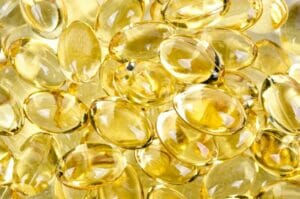Fish oil supplements have gained immense popularity in recent years, thanks to their abundant health benefits. Omega-3 fatty acids, found in fish oil supplements, play a crucial role in maintaining heart health, reducing inflammation and improving cognitive function. However, not all fish oils are created equal; there are various types of fish oil supplements available that serve different purposes for different age groups and health conditions. Therefore, it is essential to understand the different types of fish oil (Omega-3) supplements and their functions before deciding which one suits your needs the best. In this article, we will discuss the various forms of fish oil supplements and help you choose wisely!
Types of: Understanding the Differences
Fish oil supplements have become increasingly popular in recent years due to their numerous health benefits. However, not all fish oils are the same. The most common types of fish oil supplements include regular fish oil, cod liver oil, and krill oil.
Regular fish oil is often sourced from tuna or salmon and contains both DHA (docosahexaenoic acid) and EPA (eicosapentaenoic acid). Cod liver oil also includes vitamins A and D, but may not contain as much omega-3 fatty acids as regular fish oils. Krill oil comes from small crustaceans called krill and has higher amounts of EPA compared to other types of fish oils.
The type of supplement you choose will depend on your specific needs. For example, if you are looking for a supplement that helps with joint pain or stiffness, consider choosing a krill or cod liver oil supplement since they both contain extra anti-inflammatory compounds such as astaxanthin or vitamin D without any additional additives like sugar found in some gummies for taste preference making them more effective for use against inflammation than regular fish oils alone. Understanding the differences between these various types can help you make an informed decision about which one is right for you based on your goals and budget constraints – all while avoiding unnecessary additives commonly used to improve taste in many brands available today!
Standard Fish Oil Supplements: Meeting Basic Omega-3 Needs
Standard fish oil supplements are the most common type of Omega-3 supplement available in the market. They typically contain a combination of EPA (eicosapentaenoic acid) and DHA (docosahexaenoic acid), two types of Omega-3 fatty acids found in fish. These supplements are considered adequate for meeting basic Omega-3 requirements for most healthy adults.
Research has linked regular consumption of standard fish oil supplements with several health benefits, including reduced risk of heart disease, lower blood pressure, improved eye and brain function, and decreased inflammation. However, it is important to note that the amount and purity of EPA and DHA varies across different brands and products.
Overall, standard fish oil supplements can be a good option for individuals looking to boost their overall health through increased intake of Omega-3s. However, consulting with a healthcare provider or registered dietitian can help determine if there is a specific brand or dosage suited to your individual needs.
Krill Oil Supplements: A Unique Source of Omega-3s
Krill oil supplements have emerged as a unique source of Omega-3s that offer a range of benefits beyond traditional fish oils. Krill are tiny shrimp-like crustaceans found in the ocean and are an abundant source of EPA/DHA – two fatty acids that play an essential role in keeping our bodies healthy. Krill oil contains astaxanthin, a potent antioxidant with anti-inflammatory properties that can reduce oxidative damage, protecting against cardiovascular diseases and improving joint health.
The molecular structure of krill oil is also different from regular fish oils. It has phospholipids, which enable the efficient absorption of Omega-3s into the cells compared to triglycerides found in other sources. This makes it more bioavailable for human consumption leading to enhanced cognitive functioning since Omega-3s help maintain neural pathways that govern memory reactions and emotions.
In conclusion, consider trying krill oil supplements if you’re looking for an effective way to support your heart function or improve cognitive abilities while enjoying all its antioxidant benefits too!
Cod Liver Oil Supplements: Rich in Vitamins and Omega-3s
Cod liver oil supplements are a rich source of essential vitamins and omega-3 fatty acids. These natural supplements have been credited for improving joint health, boosting immune function, and maintaining healthy skin. The oil is extracted from the livers of codfish which are known to be packed with vitamin A and D as well as EPA and DHA Omega-3s.

One major benefit of cod liver oil supplements is their ability to support bone health in individuals struggling with osteoporosis or arthritis.
With high levels of Vitamin D available in the oils, the body can better absorb calcium leading to stronger bones and teeth.
In addition, omega-3s could also help alleviate depression symptoms by reducing inflammation within brain cells that cause mood disorders such as anxiety and stress.
Overall, adding Cod Liver Oil Supplements into your diet may improve overall health by providing an ample amount of nutrients like vitamin A,D, and Omega-3’s that help reduce inflammation while supporting long-term benefits operating from the inside out.
Vegan Omega-3 Supplements: Plant-Based Options
Vegan omega-3 supplements have become increasingly popular as more people adopt a plant-based diet. These supplements are derived from algae, which is naturally rich in EPA and DHA – the two primary types of omega-3 fatty acids found in fish oil. Vegan options offer an easy way to obtain these essential nutrients without consuming any animal products.
Algal oil is the most common source of vegan omega-3 supplements and has been shown to be just as effective as fish-derived sources. In fact, it may even be healthier since it does not carry the risk of environmental toxins that can accumulate in large predators like fish. Other plant-based alternatives include flaxseed oil, chia seeds, and hemp seeds, although their conversion rates to EPA and DHA may be lower than algal oil. Overall, taking vegan omega-3 supplements provides a convenient way for vegetarians or vegans to meet their nutrient needs while supporting heart health and brain function.
High-Potency Fish Oil Supplements: Targeting Specific Health Conditions
High-potency fish oil supplements have emerged as a targeted solution for specific health conditions due to their increased concentration of Omega-3 fatty acids. These supplements contain more EPA and DHA than traditional fish oil, which makes them an ideal choice for individuals with heart conditions or high cholesterol levels. Moreover, studies suggest that high-potency fish oil can also help reduce inflammation in the body, supporting those suffering from autoimmune diseases like arthritis.
Additionally, research has highlighted the potential benefits of high-potency fish oil in cognitive function. A study found that taking these supplements could improve memory and attention span in older adults experiencing age-related cognitive decline. However, it is crucial to consult with a healthcare professional before incorporating any new supplement into your diet regimen as they may interact with other medications or present side effects in some individuals.

Children’s Fish Oil Supplements: Supporting Development and Growth
Children’s fish oil supplements can provide essential Omega-3 fatty acids that support early development and growth. Omega-3s have shown to be particularly important for brain health, with research suggesting they may improve attention span, memory function and language development in infants and young children. Additionally, studies have also linked the consumption of Omega-3s in childhood to a reduced risk of developing ADHD and other behavioral disorders.
When choosing a children’s fish oil supplement, it is important to consider the dosage as well as any potential side effects or allergens such as soy or shellfish which might impact some children. To reap the benefits of these oils while avoiding any negative reactions or insufficient intake, parents are advised to consult a medical professional before starting their child on an omega-3 regime. Ultimately, ensuring that your child has enough essential nutrients through diet or supplementation will set them up for long-term physical and cognitive success.
Conclusion:
Fish oil supplements, derived from fatty fish, are a significant source of omega-3 fatty acids. Many omega-3 supplements contain EPA and DHA, both crucial omega-3 fats present in fish oil. Various forms of omega-3 supplements are available, each with unique functions.

Natural fish oil, one of the main types of omega-3 supplements, is rich in DHA and EPA. It’s usually derived from whole fish or small fish, making it a great source of omega-3 if you don’t eat fish regularly.
Processed fish oil, another type, may contain even higher concentrations of omega-3.
Omega-3 supplementation is especially beneficial for pregnant women, who may need more dietary omega-3 for fetal development. High-dose fish oil supplements, with higher mg of omega-3, can be beneficial but it’s best to determine the appropriate dosage under medical supervision.
Omega-3 fish oil may also help reduce inflammation, improve heart health, and support mental well-being. It’s worth noting that omega-3 fatty acids are essential nutrients that the body cannot produce on its own, further highlighting the importance of omega-3 supplementation or consuming servings of fatty fish per week.
While omega-3 consumption through dietary supplements can offer numerous health benefits, the choice of the best omega-3 supplements often depends on individual needs and the amount of DHA and EPA they contain.
Fish oil capsules and other fish oil supplements come in different doses, so it’s important to choose the best supplement according to your specific needs. In conclusion, incorporating fish oil or omega-3 supplements into your diet can provide significant health benefits.
Frequently Asked Questions:
Q: What are the different types of omega-3 supplements available in the market?
A: There are mainly three types of omega-3 supplements available- natural fish oil, processed fish oil, and algal oil.
Q: What are the health benefits of omega-3 supplements?
A: Omega-3 supplements may help in reducing inflammation, lowering blood pressure, reducing triglycerides, improving heart health, and may help in improving brain health.
Q: What is the source of omega-3 in different supplements?
A: Natural fish oil is extracted from fatty fish like salmon, sardines, and anchovies, processed fish oil is derived from the by-products of the fish industry, and algal oil is extracted from marine algae.
Q: What are the best omega-3 supplements available in the market?
A: The best omega-3 supplements are the ones which have high levels of EPA and DHA omega-3 fatty acids. The quality of the supplement should also be ensured by checking if it has been third-party tested for purity and potency.
Q: What is natural fish oil?
A: Natural fish oil is extracted from fatty fish and is a rich source of omega-3 fatty acids.
Q: What is processed fish oil?
A: Processed fish oil is derived from the by-products of the fish processing industry and is a good source of omega-3 fatty acids.
Q: What are the effects of fish oil on the body?
A: Consuming fish oil supplements may help in reducing inflammation, improving heart and brain health, and reducing the risk of chronic diseases like arthritis, depression, and cancer.
Q: Can fish oil supplements cause any side effects?
A: Taking high doses of fish oil supplements may cause side effects like nausea, diarrhea, and fishy aftertaste. It is always recommended to consult a doctor before taking any supplements.
Q: What are EPA and DHA omega-3 fatty acids?
A: EPA (eicosapentaenoic acid) and DHA (docosahexaenoic acid) are omega-3 fatty acids which are present in fish oil supplements. They are known for their health benefits and are essential for normal growth and development.
Q: What are the best sources of omega-3 in foods?
A: Fatty fish like salmon, sardines, and mackerel are some of the best sources of omega-3 in foods. Other sources include nuts, seeds, and plant-based oils.




 Benefits of Taking Fish Oil (Omega-3) Supplements
Benefits of Taking Fish Oil (Omega-3) Supplements
